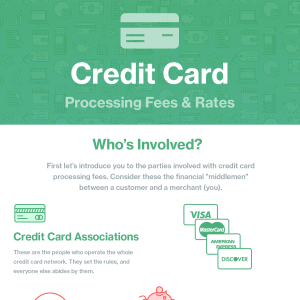A merchant services provider (MSP) is a company that enables merchants to accept credit and debit card payments. Not all MSPs are created the same, however. Check out our guide to learn more.
Our content reflects the editorial opinions of our experts. While our site makes money through
referral partnerships, we only partner with companies that meet our standards for quality, as outlined in our independent
rating and scoring system.
If you’re a new business owner or are considering adding credit and debit card payment options for the first time, you may encounter many unfamiliar terms and concepts. It’s essential to familiarize yourself with the role of a merchant services provider.
Before delving into the specifics, let’s grasp the concept of merchant services. This term encompasses a comprehensive range of business services, as well as hardware and software products. Together, these services enable merchants to accept and efficiently process credit/debit card transactions, accept other non-cash means of payment, and generally run their businesses on a day-to-day basis.
Merchant Services Provider: What Does It Mean?
A merchant services provider (MSP) is a company that enables merchants to accept credit and debit card payments, as well as alternative payment methods such as ACH transfers. Merchant service providers usually offer a larger suite of services to accompany their payment processing, including business data, POS software, and payment gateways.
Merchant services providers are sometimes also referred to as acquirers, processors, or merchant account providers. Here at Merchant Maverick, we use the term merchant services providers as a catch-all to cover entities such as merchant account providers, payment services providers (PSPs), payment gateway providers, and any other type of business that allows you to accept payment methods other than cash or paper checks.
What Types Of Merchant Services Providers Are There?
Not all merchant service providers offer the same features, but most fall into one of several categories that help to differentiate them a little from their competitors. The most common types of merchant service providers include the following:
Merchant Account Providers
Merchant account providers are the most commonly encountered types of merchant service providers. A merchant account provider can, at a minimum, provide you with a merchant account and credit card processing services to ensure that you receive your money when a customer pays by credit or debit card. While all merchant account providers can set you up with a merchant account, only a few of the largest companies can also offer processing services to process your transactions through the credit card networks (Visa, Mastercard, American Express, etc.). These companies are called direct processors and include industry leaders such as Chase Payments Solutions, Fiserv, FIS Worldpay, and Global Payments. Most other merchant account providers rely on one of these direct processors to process their merchants’ transactions.
Payment Services Providers (PSPs)
While having a merchant account is a good idea for all but the smallest of businesses, you don’t absolutely need one to accept credit or debit card payments. A payment services provider (PSP), such as Square or PayPal, can give your business the ability to accept credit card payments without a dedicated merchant account. Instead, your account will be aggregated with those of other merchants, and you won’t have a unique merchant ID number. This arrangement has the advantage of virtually eliminating the account fees and lengthy contract terms that often come with a traditional merchant account. However, these accounts are more prone to being frozen or terminated without notice, and customer service options aren’t as robust as those with a full-service merchant account. PSPs are an excellent choice for businesses that only process a few thousand dollars a month in credit/debit card transactions or only operate on a seasonal basis.
Payment Gateway Providers
With the advent of eCommerce, a new kind of provider has come on the scene: the payment gateway provider. These companies can offer you a payment gateway, which you’ll need to accept online payments. However, they may or may not also offer you a merchant account to go with it. Authorize.Net, one of the largest and oldest gateway providers, gives you a choice between one of their merchant accounts or using their gateway with your existing merchant account. Other providers, such as PayTrace, offer a gateway-only service. You’ll have to get your own merchant account from a third-party provider.
What Products & Services Do Merchant Services Providers Offer?
Most merchant services providers offer a wide variety of products and services to allow merchants to accept credit card and debit card payments, as well as manage their inventory and track other aspects of their business. Your needs as a merchant will depend on the nature and type of your business. While all businesses will need either a merchant account or a payment service account (if you’re signed up with a PSP), other features will only be useful for certain types of businesses. For example, if your business doesn’t sell anything online, you won’t absolutely need a payment gateway. Here’s a brief overview of the most common types of merchant services:
Merchant Accounts
Every business that wants to accept credit cards or debit cards as a form of payment will need a merchant account. While most merchant account providers offer full-service merchant accounts, those from PSPs lack a unique merchant ID number. Merchant ID numbers make your business easier to properly identify to payment processing systems, giving you some protection from fraud and adding stability to your account. A merchant account is simply an account where funds from processed transactions are deposited. Those funds are then transferred by your provider into a business account that you specify, such as a business checking account.
Mobile Payment Processing
These systems allow you to use your smartphone or tablet as a credit card terminal. The best mPOS systems consist of a mobile card reader that connects to your mobile device and an app to communicate with your provider’s processing network. While Square was the first provider to offer a simple mPOS system, most providers now offer similar products. Your mobile card reader should support EMV payments at a minimum, and preferably NFC-based contactless payments as well. Card readers that connect via a headphone jack are being phased out in favor of Bluetooh-enabled models that can connect to virtually any smartphone or tablet.
Credit Card Terminals
Retail merchants will also need a hardware product that can read your customers’ credit and debit cards and then transmit that information to your provider’s processing network. While traditional countertop terminals offered basic transaction processing capabilities and little else, most modern terminals include color touchscreens, separate customer-facing displays, and ‘smart’ functions, such as the ability to add additional software programs that can help you run your business. Landline and ethernet connectivity has mostly been replaced by wireless terminals that use Wi-Fi or LTE to communicate with the processing networks. (Note that LTE connectivity usually requires a separate mobile data plan subscription for use away from your place of business.)
Credit card terminals may be purchased outright or leased from your merchant services provider. In most cases, we recommend buying your terminal directly from your provider to ensure compatibility. Terminals require a software load that must be installed before they can accept transactions. If you want to use an existing terminal with a new provider, you’ll need to have it re-programmed to install this software. We strongly discourage terminal leasing due to the noncancelable nature of the leases and the fact that you’ll pay several times more than the value of the terminal over the lifetime of the lease.
Any terminal you select will need to be EMV-compliant at a minimum. Support for NFC-based payment methods (such as Apple Pay and Google Pay) is also a good choice, as these methods are becoming more popular among customers.
As the payments industry has moved away from unpopular terminal leases, it’s increasingly common to see providers offering a “free” terminal with your account. Unfortunately, there is always a catch with this kind of offer. In most cases, you’ll have to sign up for a long-term contract (with an early termination fee) in exchange for this “free” equipment. You’ll also have to quickly return the terminal if you close your account for any reason. We generally recommend against free terminal offers, although they may be an acceptable choice in some circumstances.
Point-Of-Sale (POS) Systems
POS systems combine the functions of a credit card terminal with a large computer display, enabling you to manage inventory and monitor your sales through a single piece of equipment. These systems include fully-featured, dedicated terminals and tablet-based software options that can run on an iPad or Android tablet. Many providers offer optional accessories such as tablet mounts, cash drawers, and check scanners, allowing you to accept any form of payment through a single device. In addition to being more expensive than most credit card terminals, POS systems often require an additional monthly software subscription fee.
Payment Gateways & Virtual Terminals
A payment gateway is simply software that communicates between your website and your provider’s processing networks, allowing you to accept payments over the Internet. Because not all merchants need a gateway, providers often charge a monthly gateway fee (typically around $25.00) to access this feature. Most gateways include support for recurring billing, a customer information management database, and security features such as encryption or tokenization to protect your customers’ data.
A virtual terminal is another software product that turns your laptop or desktop computer into a credit card terminal. Transactions can be entered manually or swiped using an optional card reader. Virtual terminals are most commonly used by mail-order/telephone-order businesses that don’t have an eCommerce website. Be aware that processing fees for manually keyed-in transactions are notably higher than they are for other in-person payments.
Online Shopping Cart Integration
Shopping cart software is designed for eCommerce merchants who need a more specialized shopping experience or want to customize the features of their websites. Shopify is one of the most popular online shopping carts. Check compatibility with your merchant services provider before selecting an online cart.
ACH & eCheck Processing
Automated Clearing House (ACH) transfers allow a customer to pay you directly from their bank account without using a debit card. Although the ACH processing network is somewhat slow, it’s become a popular alternative method for eCommerce businesses to accept remote payments from customers. ACH transfers are also much less expensive to process, making them a popular alternative to credit cards for many merchants. While most merchant services providers offer ACH processing services, note that you will need to undergo a separate underwriting process (and usually pay an additional monthly fee) to add this feature to your account.
Often confused with ACH transfers, eCheck processing is an optional feature offered by most merchant service providers. It allows you to scan paper checks and instantly confirm that funds are available to cover the purchase. This service protects you from fraud and saves you a trip to the bank.
Support For Alternate Payment Methods
Due to the emergence of new payment technologies and the need to accept contactless payment methods during the recent COVID-19 pandemic, alternative payment methods have become increasingly common. QR code payments allow customers to make payments using just their smartphones, reducing the need for a traditional credit card terminal. Digital invoicing services allow freelancers and independent contractors to send invoices via email or SMS, and make it easier and more convenient for your customers to pay you. Some merchant services providers even support cryptocurrency payments, allowing customers to pay you in BitCoin or a similar digital currency.
Which alternative payment methods are right for your business will depend on how you accept payments from customers (online or in-person), among other factors. In any event, we recommend adding any alternative payment methods that make sense for your business, as they will usually lead to an increase in sales by giving your customers as many options as possible for making a purchase.
Final Thoughts On Merchant Services Providers
Which specific merchant services you need will depend on the nature of your business.
Retail-only businesses won’t need a payment gateway, but they will need reliable credit card terminals. eCommerce businesses can’t function without a payment gateway, but do not require terminals. Of course, if your business operates in both the retail and eCommerce sectors (which is becoming much more common), you’ll need just about every service your provider has to offer.
Every merchant service provider has their own unique combination of products and services, so you’ll want to ensure that a provider offers the features that you need before you sign up. Many of these services are proprietary, meaning they’ll only work with the provider that offers them. While this helps to ensure compatibility between different products, it also means you won’t be able to take your favorite product with you if you switch providers. This is more of a factor in the eCommerce sector, where payment gateways are often proprietary products. For an overview of our highest-rated merchant services providers, check out our guide to the best credit card processors for small businesses.











